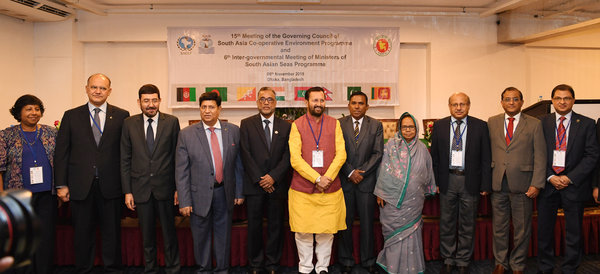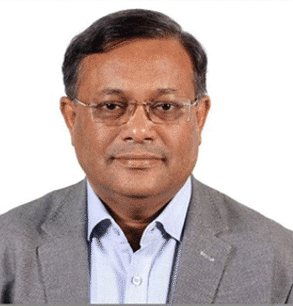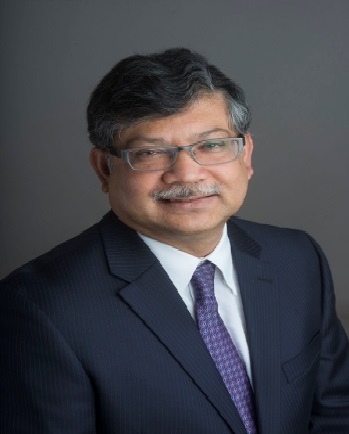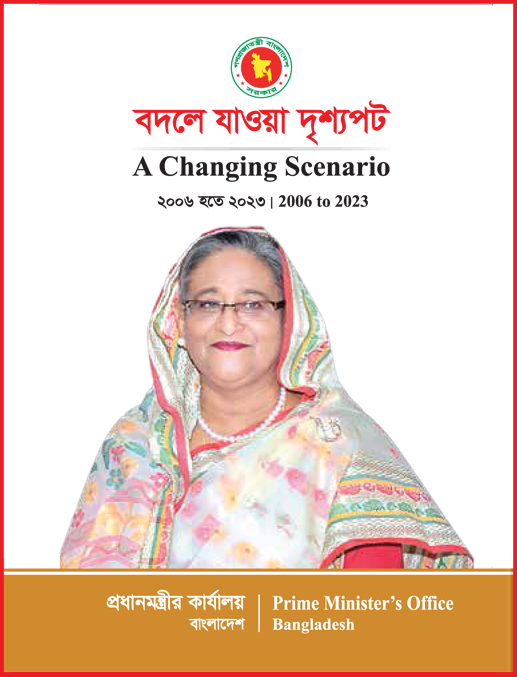Speech by His Excellency Dr. A. K. Abdul Momen, MP, Hon’ble Foreign Minister, Government of the People’s Republic of Bangladesh at the Inaugural Ceremony of the 15th Meeting of the Governing Council of the South Asia Co-Operative Environment Programme (SACEP)

Hon’ble Md .Shahab Uddin, MP
Minister, Ministry of Environment, Forest and Climate Change, Bangladesh
Hon’ble Prakash Keshav Javadekar
Minister for Environment, Forest and Climate Change, India
Hon’ble Ahmed Mujthaba
Minister of State for Environment, Republic of Maldives.
Hon’ble Habibun Nahar, MP
Deputy Minister, Ministry of Environment, Forest and Climate Change
Hon’ble Abas Basir, Director General, SACEP (South Asia Co-operative Environment Programme).
Secretary General, CITES
Assalamu Alaikum and good morning.
I am delighted to be here at the Inaugural Ceremony of the ‘15th Meeting of the Governing Council of the South Asia Co-Operative Environment Programme (SACEP). I must commend Ministry of Environment, Forest and Climate Change, the SACEP Secretariat and all others, who collaborated in organizing this event. Let me appreciate and congratulate the SACEP Members for their continuous efforts in promoting regional co-operation in environment and climate change issues in the context of sustainable development.
Excellencies,
You are aware that Bangladesh has often been cited as a ‘development miracle’. Despite vulnerability to climate change impacts, Bangladesh continued to prosper over the last 10 years. Bangladesh recorded the highest economic growth among a list of the 26 countries in the last 10 years, with 188% expansion of our gross GDP. This year, GDP growth has reached to 8.13% and as per ADB, highest amongst 45 Asia-Pacific countries.
This, development miracle has a secret. Let me call it the ‘Bangladesh Secret, Sheikh Hasina Miracle’. It is the collective journey towards fulfillment of the dream of making Bangladesh a Shonar Bangla (The Golden Bengal) by the Father of the Nation Bangabandhu Sheikh Mujibur Rahman. And thanks to the vision, pragmatism, leadership and statesmanship of his daughter, our Hon’ble Prime Minister Sheikh Hasina, Bangladesh is well and truly in her journey to a developing country by 2021 and hopefully will attain the SDGs by 2030, become a developed country by 2041 and a Prosperous Delta by 2100.
Towards this end, we continue to embark on a pragmatic programme for the rapid economic and social development. Poverty eradication, sustainable growth, protection of the environment, human-resources development and digitization are some of the key features of our development strategy. Over the past 10 years, we have been adopting progressive and timely policies and actions that have resulted in impressive inclusive development.
Poverty and inequality are two major obstacles for development. Bangladesh has achieved one of the fastest poverty reduction rates in the world with poverty rate dropping from 41.5% in 2006 to 21.4% in 2018, extreme poverty from 28% to 11.3%. Our extensive rural development initiatives like ‘My Village My Town’ ‘Ashrayan’, and ‘Amar Bari Amar Khamar’, have contributed to our inclusive development. Bangladesh has been ranked 34th in World Economic Forum’s Inclusive Development Index leaving other South Asian countries way behind. In our development approach ‘‘we want inclusive development where no one is left behind’’.
Ladies and gentlemen,
Although we are doing well, we are faced with a big challenge and it is climate change. Our vulnerability to climate change impacts is well evidenced and well documented. I must not bore you with facts or figures to illustrate Bangladesh as one of the world’s most vulnerable countries to climate change; rather I would reiterate how Bangladesh has become one of the most resilient countries in the world. However, just for your information, 1 meter rise in sea-level is likely to uproot nearly 30 million people of Bangladesh and climate vulnerability is costing nearly 1-3% of our annual GDP growth rate.
Nevertheless with our limited resources, we are addressing the consequences of climate change. Despite being a developing country, we spend more than 1 percent of our GDP in combating climate change. We are pursuing a low carbon development path with increasing emphasis on renewable energy, energy efficiency and energy conservation. Over the last few years, we have installed more than five million solar home systems in off grid areas and more than 3.5 million improved cook stoves. We have built over 14,000 Cyclone Shelters and we mobilize nearly 42000 volunteers for cyclone disaster warning at hours notice.
We have taken initiatives to increase tree coverage from 22% to 24% in the next five years. So far Bangladesh has created 200000 hectares of coastal forests as shelterbelt to protect from tidal surges and waves. Bangladesh is also successfully managing 600000 hectares of Sundarbans Mangrove forest, a great carbon sink. We have been engaged in creating resilient forests in offshore areas to protect forest dependent communities and habitats of important forest biodiversity.
Excellencies,
Bangladesh being one of the most vulnerable countries to climate change is also at the forefront of learning how to tackle the adverse impacts of climate change. It has started as early as 2009 a Comprehensive National Act Plan and set its 2 Trust Funds. This is a great opportunity for us to demonstrate our own strategies to adapt to climate change, build resilience as well as to share our knowledge and experience with you. We are building Climate Adaptation Center in Bangladesh to share our experience and expertise to the climate vulnerable countries.
Tackling climate change is directly linked with sustainable development and resilience building. In line with this perspective, under the leadership of Hon'ble Prime Minister Sheikh Hasina, Bangladesh is carrying forward its efforts for sustainable development with specific plans for ‘Carbon budgeting’, ‘de-carbonization of manufacturing pathways’ and low-carbon industrialization. Considering multidimensional vulnerabilities posed by climate change and disasters, our Government has recently adopted Delta Plan 2100, which will provide Bangladesh with the sustainable development pathway for the next 100 years.
Distinguished Delegates,
The halting of the global climate change and reduce disaster risks will largely depend on the implementation of the 2030 Agenda, the Paris Agreement and the Sendai Framework to their true letter and spirit. The recently adopted Global Compact for Migration has also acknowledged that investing in, and accelerating global cooperation for, climate change mitigation and adaptation would contribute to the elimination of the adverse drivers and structural factors that compel people to leave their country of origin.
You all know, we have given shelter to 1.1 million forcefully displaced Rohingyas from Myanmar in our 6800 acres of forest land in Cox’s Bazar. It is in an extremely vulnerable location, their presence affecting our ecosystem. It is the responsibility of the global leadership, especially our South Asian partners, to do more to ensure their quick return to Myanmar. It is an issue solely between Myanmar and its own people, the Rohingyas. They themselves have to resolve it. Voluntary return of the Rohingyas to their homes in Rakhine state in safety, security and dignity is the only solution to the crisis.
Excellencies,
Protected and restored ecosystems and the biodiversity can help mitigate climate change and provide increased resilience in the face of mounting human pressures and natural disasters. Healthy ecosystems produce multiple benefits for communities that rely on them. The SDGs focuses on preserving and sustainably using the earth’s terrestrial species and ecosystems. Achieving SDGs will critically depend on the availability of resources and rock solid political commitment. To achieve sustainable development goals by 2030, we need to strengthen our commitment to work collectively in partnership in mobilizing resources both finance and technology and utilizing available knowledge and information for mutual betterment.
I personally see a vast area of possible cooperation under the aegis of SACEP. Our active collaboration and cooperation will be very crucial for successful implementation of the SDGs as well as the Paris Climate Agreement. I hope this meeting of SACEP will identify the possible areas of cooperation and bring the SACEP member states closer to each other for further cooperation in the conservation and management of natural resources of the region. I wish the meeting every success.
Joy Bangla
Joy Bangabandhu.
I thank you all.













